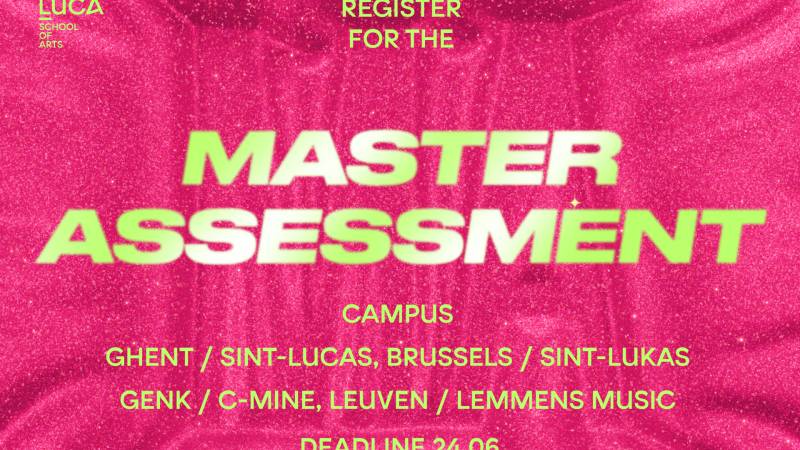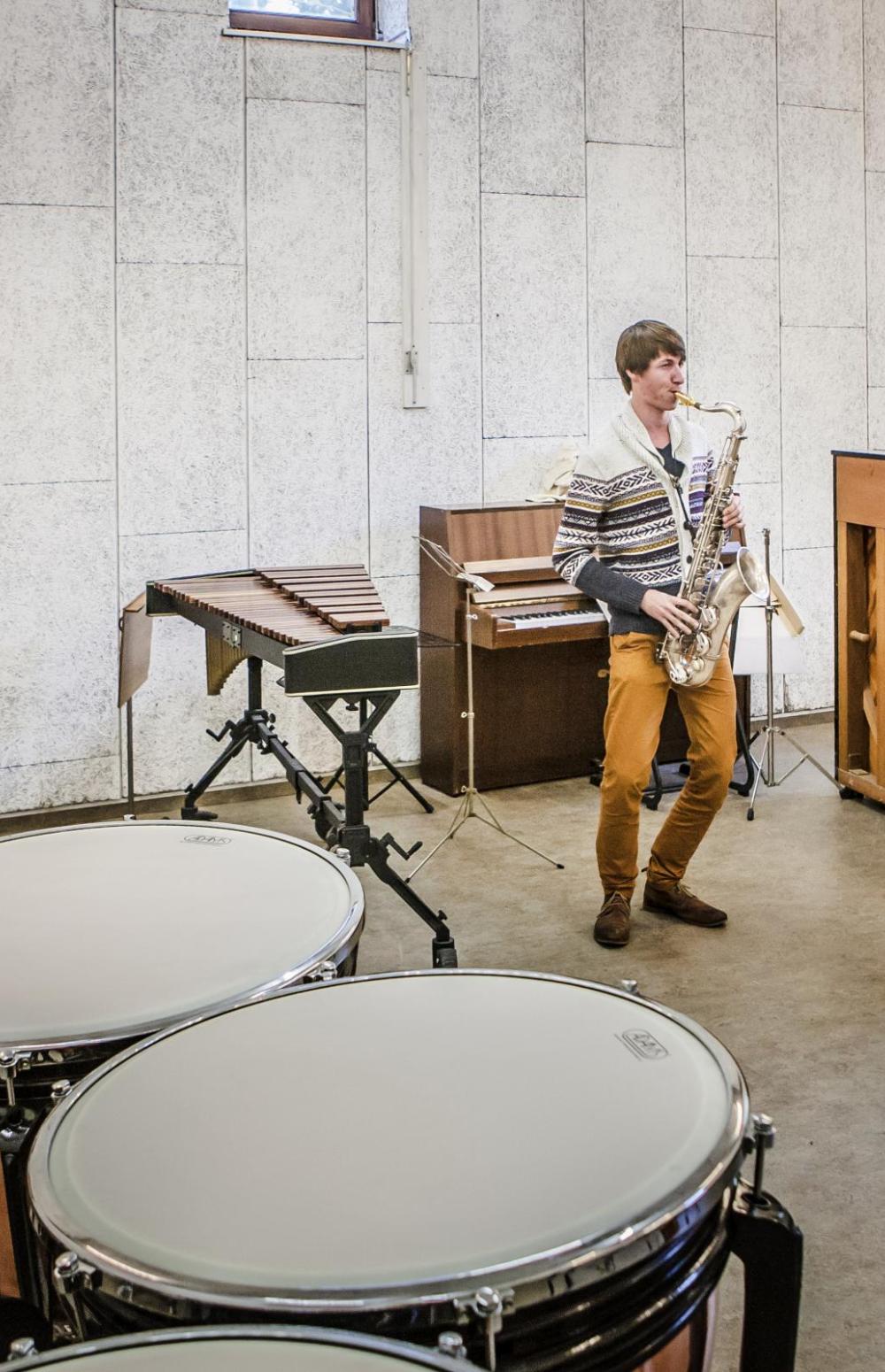
Campus Leuven / Lemmens
Jazz Performance
Jazz
During the master years, students can choose from a number of instrument or more theoretically oriented courses. In this way, they can continue their personal development.
In addition, students are familiarized with processing information and the development of new ways of thinking. Thus, they come to reflect on their own music practice, resulting in a thesis as part of the integrated master project (lecture/performance).
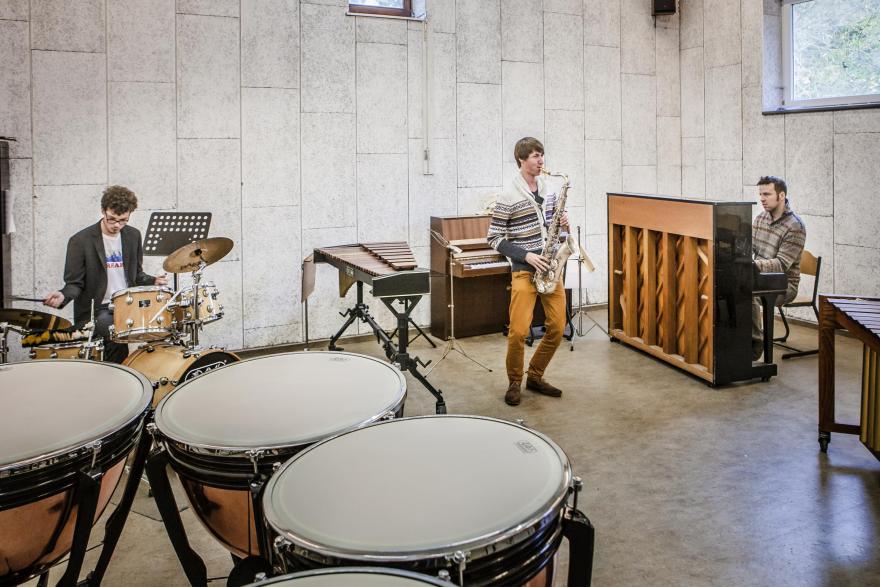
Central to this specialisation are lessons in the main instrument and in ensemble. To guarantee an optimal learning experience, these are linked as much as possible. All the skills acquired during instrument lessons are actively applied in various ensembles. Classic training techniques dovetail directly with this. Concerts are regularly organised.
This broad, multifaceted training offers many perspectives in different work environments. Tutors are prominent jazz musicians who are not only active on the jazz scene but also composing, arranging, producing.
If you are not yet sure of your own profile, our teachers and programme counsellors will help you discover it. Once you have chosen a specific profile, you can still set your own emphases. After all, from year to year, you compose a large part of your individual study programme.
If you want to know more about which subjects you will be taking, take a look at the education offer with study guide for content and credits for bachelor and master.
From the academic year 2022-2023, LUCA School of Arts, Campus Lemmens will offer a new Master's curriculum in Music.
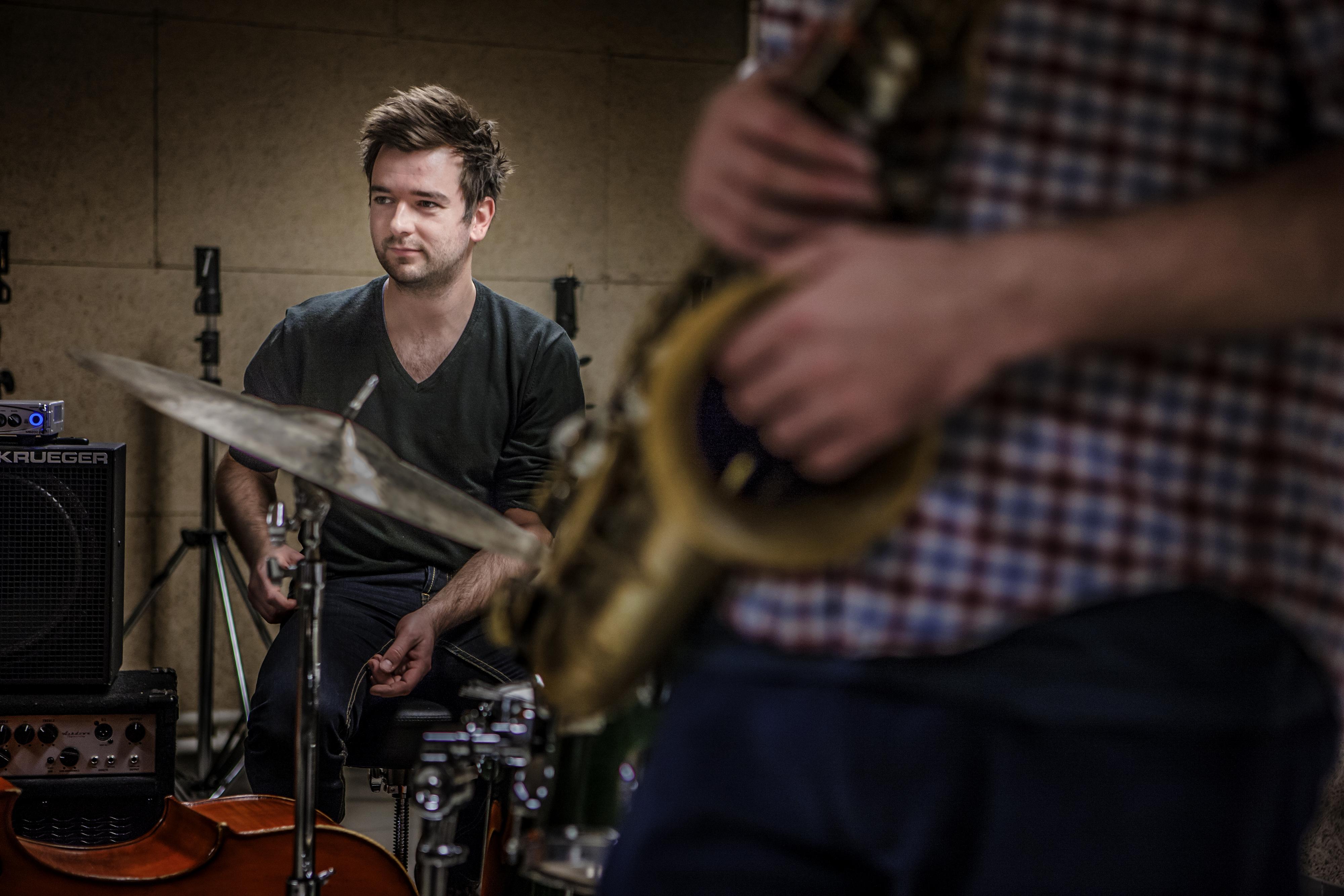
Curriculum
The master's thesis
The master's thesis consists of two self-selected artistic projects: a recital and a research-based recital. You present both recitals to a jury of internal and external experts during a public presentation. You substantiate and contextualise it with a thesis that situates your work within or against existing literature and debates. With this, you prove that you can orient yourself within the field of your artistic discipline. With your master's thesis, you prove that you work largely independently. From your first master's year onwards, you work on your research project with support from your main subject teacher and thesis supervisor.
Inspiration for your master's thesis
|
Masterclasses, symposiums and intense practical experiences Every year, LUCA Music organises interesting master classes and workshops with external experts and renowned national and international musicians. Music practice takes centre stage on our campus. You not only make music during your practical lessons or self-study, but also participate in our ensembles, choirs and orchestras and our prestigious artistic productions. These experiences shape you into a team player. |
Cross-overs LUCA School of Arts is a habitat in which collaboration between students of different arts disciplines is encouraged. This creates interesting crossovers and innovative artistic practices. Students can also take optional subjects from all LUCA programmes, ranging from film or photography to graphic design or interior design to product design or sculpture. |
General Part
All students within the Jazz Performance Programme take subjects such as main instrument, artistic projects and (co)creations and ensemble.
New from 2022-2023 is the Professional Toolkit. In this 6-credit course, students are strongly oriented to the future professional practice of a musician. You gain insight into the organisational, financial and social aspects of professional practice. You acquire additional skills that you can apply in future practice. Within this subject, students choose a combination of compulsory and freely selectable components such as Entrepreneurship, Performance psychology, Scenic awareness or an internship at the production office, etc.
Electives
Students can deepen their knowledge within their own specialisation/degree course or broaden their knowledge by taking electives within and other degree courses. Elective courses such as (Practical) Harmony, Introduction to Arts Education are complemented by 7 semester-organised workshops - of 6 credits from which the student can choose. A number of minors (fixed package) are also offered within that elective.
|
Minors For students with an interest in one of the other programmes, a series of minors of 12 credits each is now also offered within the Music Master's elective. For example, a piano student can study composition or a composition student can study conducting, etc.
|
Ateliers Within the Music majors, students can use (at least) 12 credits per master year within the electives. They choose 1 or 2 of the following 7 new ateliers (of 6 credits).
|
|
International Traineeship In the new curriculum, it is also possible to redeem short international experiences in 3, 6, 9 or 12 credits. |
Cross-Campus Electives Students will have the opportunity to take (elective) courses from another programme at one of LUCA School of Arts' campuses. |
In short
- A 2-year programme of 120 ECTS
- Tutors are prominent jazz musicians
- Plenty of opportunities to practice, rehearse and perform

Interested in this course?
Enrollment procedure
The application and enrollment procedure at LUCA School of Arts consists in general of three steps.
- First you will have to submit an online Admissions application in which you will be asked to upload certain documents required for the Admissions’ diploma and language check. We will be checking if you meet with the diploma and language requirements.
- The second step continues with your participation in a Master Assessment.
- Step three is the final and binding (online) registration (for which you will receive a unique registration link after succeeding the Master Assessment).
Do you want to start a Master's degree at LUCA?
Then you must pass the MASTER ASSESSMENT
Where do you have class?
Facilities & campus life
- Our very own campus, situated in a parc in one of Europe's oldest university towns
- An artistic meeting space for theater maker and musicians
- A coworking space with rehearsal studio's concert halls and theater venues
- An art centre with concerts, performances and theater shows, lectures and artist talks, book launches, graduation shows and showcases
- An expertise centre for young perfomnce artists with an art library, production support and a lending service
- An intricate network of cultural partners where students rehears and show the results of their projects
Location
Lemmensberg 3
3000 Leuven
info.lemmens@luca-arts.be
+32 2 447 15 00
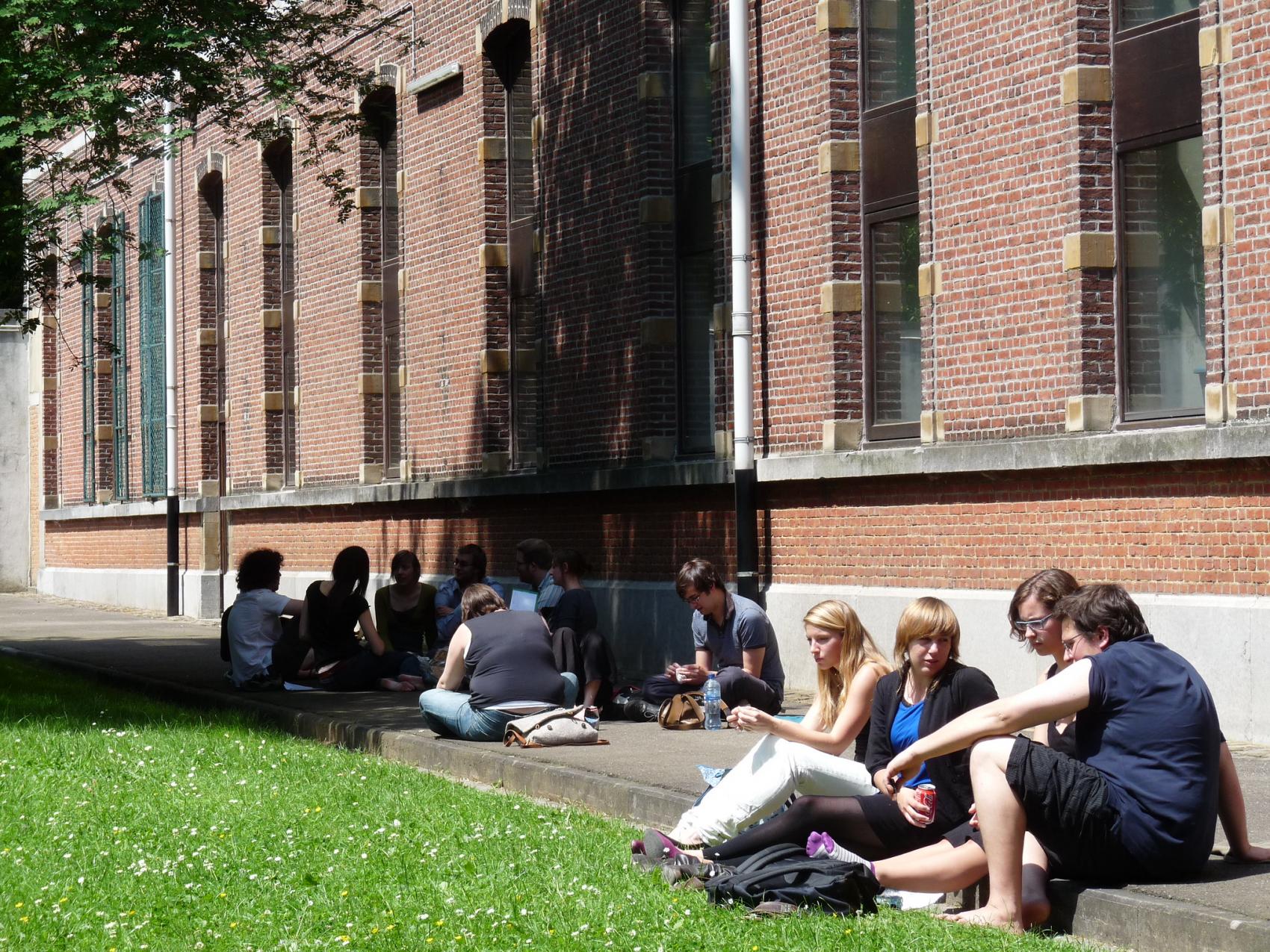
Masterassessments
- Deadline : 26.06 2023 (11:00) - Interview/test: 03.07.2023
- Deadline : 18.08 2023 (11:00) - Interview/test: 24.08.2023
Contact
Lemmensberg 3
3000 Leuven
info.lemmens@luca-arts.be
+32 2 447 15 00
At LUCA we attach great importance to the quality of our courses
If the basic principle of the policy plan means that 'quality is our driving force', and that every aspect of the policy can be tested against this, then LUCA undeniably wants to develop and nurture a strong quality culture: a culture that leaves based on trust in people with talent and expertise, and which is aimed at valuing, inspiring and improving.
The formal quality framework for training within LUCA was named KOPERA, which stands for: Critically Analyzing the Quality of Training with Peers in Own Direction.
For KOPERA, LUCA starts from a vision of quality care that is based on trust and aimed at valuing, inspiring and improving.
During the six-year KOPERA cycle, each training course receives a panel of critical friends who examine the implementation of the quality characteristics and examine how the training contributes to the general LUCA policy.
The final element of KOPERA is the ultimate assurance of training quality. The key question is: "Does the program have a good quality culture that follows the 'plan-do-check-act' circle?"
LUCA publishes a quality sheet for each course. You can find this on the Education Quality page.
"At campus Lemmens I was taught the seriousness of music and made to understand the craft required for high-quality 'musicianship'. The location on the beautiful hill of the Lemmens exudes a rich history that still has an inspiring effect. A certain nostalgia and beautiful memories come to me when I get close ... "
Starting as a professional musician
Studies show that 90% of Music graduates are at work within the year. As a master of Music, you can work in an orchestra or an ensemble as a conductor or composer. You can also develop an independent practice.
A job in education is also within the possibilities. As a music educator, you can also take different paths. You can teach, strengthen the educational service of, for example, an ensemble or work with vulnerable groups such as underprivileged young people in community centres.
Continue studying
Postgraduate Master of Music
LUCA-Campus Lemmens organises a two-year-long course of study. During this programme, you can prepare your entrance to the professional music world: learn repertoire useful for competitions or auditions, give two recitals during regular concert seasons, and deepen your understanding of musical interpretation through artistic research.
You can choose between three specialisations:
- Soloist
- Chamber Music (for already formed ensembles)
- Contemporary Music
Visit us on campus
Are you curious about our approach to Music & Drama education? During our Trial Days, you will get all the information you need, visit the campus participate in classes, ...
Still not convinced visit us during the open campus day. During this on-campus micro festival you can experience first hand how good our students really are.
Confinement Blues
Written and arranged by Peter Hertmans
Your personality and your ambitions are the starting point in our music training. Your teachers are not teachers who impose working methods, but coaches who help you devise your own solutions and tell your own story. For them, there is no better challenge than to support and inspire you. These tutors are prominent jazz musicians who are not only active on the jazz scene but also composing, arranging, producing… As a master student, you will take the lead but they will support you.
| Double Bass | Jos Machtel | |
| Drums | Dré Pallemaerts | |
| Electric Bass | Louise van den Heuvel | |
|
Guitar |
Tim Finoulst | Roeland Celis |
| Jazz Vocals | Lynn Cassiers | Ariadne Van den Brande |
| Piano | Nicola Andrioli | Alex Koo |
|
Saxophone |
Frank Vaganée | |
| Trombone | Dree Peremans | |
| Trumpet | Dree Peremans |
Other courses
| Art in Context | David Lodewyckx | Bart Geerts |
| Maxime Waladi | Barbara Vandendriessche | |
| Art Philosophy | Annelies Monseré | |
|
Ear training |
Bart Van Caenegem | |
| Entrepreneurship | Peter Anthonissen | |
| Harmony | Peter Hertmans | Jos Machtel |
| Practical Harmony | Bart Van Caenegem | |
| Music Analysis | Peter Hertmans | Jeroen D'hoe |
| Music History | ||
| Research coaching | ||
| Research in Performing Arts | ||
| Rhythm |
"The entire team of lecturers at Lemmens has been extremely important in my musical development. Their dedication and motivation was contagious. They enjoyed studying and knowledge was shared among students. In such a spontaneous atmosphere, growing becomes effortless. When they started asking to play "real" concerts with them, I couldn't be happier.
A concrete example? During the holidays Frank and Ron enthusiastically decided to book a study trip to New York. I was allowed to join. We shared an apartment and listened to several concerts every day. Without realizing it, that turned out to be the stepping stone for my decision to move to New York to be able to grow musically. "

